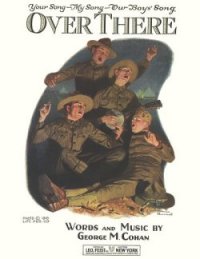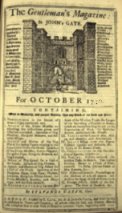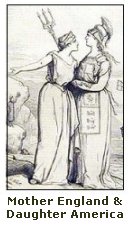
| Illuminations Home |
|
| Military
Songs |
|
| The Revolution & Before | |
| The
Wabash to Mexico City |
|
| Civil War | |
| Indian Wars | |
| Spanish-American War | |
| World War One | |
| World War Two | |
| Cold War | |
| Vietnam War | |
| Global War on Terror | |
Illuminations, Epiphanies, & Reflections
Military Songs
American
Revolution and Before  Another song that was inspired by the Stamp
Act
and Declaratory Act was The Old
Woman Taught Wisdom. When it was first published
in Another song that was inspired by the Stamp
Act
and Declaratory Act was The Old
Woman Taught Wisdom. When it was first published
in London's Gentleman's Magazine
in 1767, the anonymous author stated
that his song was "an humble
attempt to
reconcile the parent and her children, made by a peacemaker to Great
Britain and her Colonies." London's Gentleman's Magazine
in 1767, the anonymous author stated
that his song was "an humble
attempt to
reconcile the parent and her children, made by a peacemaker to Great
Britain and her Colonies." Like many of the liberty songs, it was based on an old tune; this one was originally used for a song popular with the Cavaliers in the English Civil War, The World Turned Upside Down, whose multiple verses lamented the prohibition against celebrating Christmas in traditional English manner following Oliver Cromwell's victory at Naseby in 1645. The first verse of that song reads: news hath not been this thousand year: You never heard the like before. You see the world turn'd upside down. With Cromwell's defeat in 1560, the old lyrics fell out of use and were replaced with a new set in The King Enjoys His Own Again, celebrating the return of the monarch. Interestingly, the New England Puritan's continued to ban the celebration of Christmas, and Massachusetts actually criminalized its observance. The first verse of The King Enjoys His Own Again reads: What Booker [a famous, contemporary
astrologer] can prognosticate Although originally published in
London, The Old Woman Taught Wisdom,
became a popular song in America. |
| The
Old Woman Taught Wisdom (to the tune of The World Turned Upside Down/The King Enjoys His Own Again) Goody Bull and her daughter together
fell out, In
vain did the matron hold forth in the cause, Young,
froward, and sullen, and vain of
her beauty, Zounds, neighbor! quoth Pitt, what the
devil's the matter? She
be -, says the farmer, and to her he goes, Adzooks,
ope thine eyes, what a pother is here ! Alas!
cries the old woman, and must I comply? Unwillingly
awkward, the mother knelt down, No thanks to you, mother; the daughter
replied: |